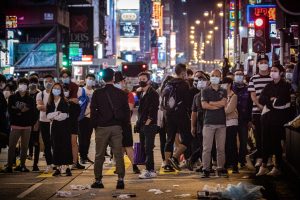Amid political unrest and the resulting disruption to businesses citywide, mainland Chinese tourist arrivals in Hong Kong plummeted in the second half of 2019. In last October alone, the number of visitors from the mainland dropped by 45.9 percent year-on-year (YoY). Retail sales consequently declined by 24.3 percent YoY in the same month. Sales in jewelry and watches were hit the most, falling by 42.9 percent YoY, followed by medicines and cosmetics (down 33.5 percent).
Hong Kong’s economic growth has long been overly dependent on tourism. The contribution of travel and tourism to the city’s GDP was 17.4 percent in 2018, the year before the massive, months-long protests. Over the past two decades, travel and tourism’s contribution to local GDP has risen continually from roughly 9.0 percent in 1998. Such data demonstrate that Hong Kong’s economic growth has been largely dependent on the thriving and ever-growing tourism industry. But this over-reliance on tourism has been harming Hong Kong’s economy since the second quarter of 2019, when a fall in mainland tourists entering Hong Kong and a weakening renminbi (RMB) were both recorded. A weakening RMB made consumption of Hong Kong’s products less appealing to mainland tourists, contributing to the fall in local retail sales.
In a survey carried out by the Hong Kong Retail Management Association (HKRMA), 30 percent of local retail companies said they expected to lay off 10 percent of their staff, while 43 percent would close down their businesses, in the second half of 2019. The unemployment rate in sectors related to consumption and tourism rose from 3.9 percent in June 2019 to 5.0 percent in last October.
Now an outbreak caused by a novel coronavirus has compounded the decline in economic performance of the tourism and related sectors. Retail sales dropped by 21.4 percent YoY in January, marking the 12th consecutive month of decline in the values of retail sales locally. Lawrence Wan, senior director for advisory and transaction services-retail at Commercial Real Estate Hong Kong, expressed concern about the difficulties for landlords to retain their tenants, hinting a further rise in unemployment rate may be recorded.
In response to the twin political and health crises, the Hong Kong government should temporarily raise the amount of monetary assistance for unemployed and poor populations from the Comprehensive Social Security Assistance (CSSA) scheme. The government should loosen the asset test and income test requirements set in the CSSA scheme in order to ensure that more unemployed people who have an urgent financial need can apply for the scheme and secure the basic social protection from the government.
The government should additionally create remote entry-level and part-time jobs for those who have been laid off in the past 12 months. Amid the health crisis, remote work can help avoid unnecessary contacts with others. Doing part-time work restricts the amount of income, so as to prevent individuals from failing to pass the income test for the CSSA scheme. Also, creating more entry-level jobs entails less financial investment by the government than offering upper-level jobs. Under such a policy, more unemployed Hong Kongers could receive a certain amount of income from doing temporary jobs offered by the government. Such a policy is conducive to both the financial security of those unemployed and the growth of Hong Kong’s economy.
Moreover, David Ji, director and head of research and consultancy for Greater China at Knight Frank, argued that retailers who used to have stores in major shopping areas are the most negatively affected by the widespread coronavirus, since people avoid going to crowded areas. In response, the Hong Kong government should target the economic potential of local e-commerce businesses. Hong Kong’s revenue in the e-commerce market is expected to amount to US$5.511 billion in 2020. Revenue is expected to show an annual growth rate of 6.8 percent from 2020 to 2024. Hong Kong’s government should consider an exemption from the profit tax for newly registered e-commence businesses in this fiscal year. This would help propel the expansion of the e-commerce market locally and encourage companies that are liquidating due to expensive rents in major shopping areas to continue their contribution to the retail industry. Individuals who are incentivized to start up e-commerce businesses can make their own living and rely less on the governments’ subsidies and social welfare, overall lessening the government’s financial burden. In the long term, the promotion of a retail transition from in-store to online sales can benefit Hong Kong’s economy as retail costs would fall while the retail market would grow.
Jason Hung is a visiting researcher at Stanford University and a Clinton Global Initiative University (CGI U) fellow at Clinton Foundation.

































